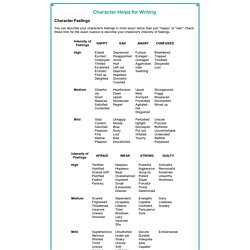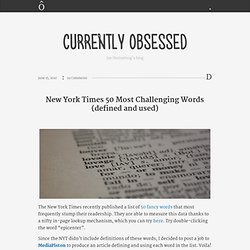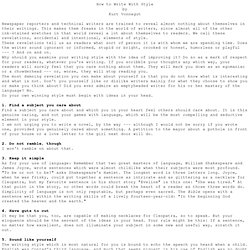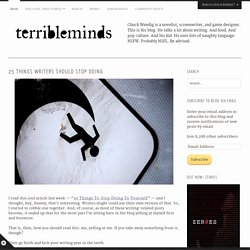

CALLIHOO Writing Helps. Character Feelings.

Ruth Gerson: How to Write a Song: For Writer's Block or Beginners. From: San Francisco Vocal Coaching's "Singing, Songwriting and Performance" Class (I've also taught it at Princeton University.)

How To Write A Song, Exercise 1 (for beginners, or for writer's block): Write a letter to someone you feel intensely about something you feel intensely about. If you don't feel intensely about anyone or anything, pretend you are someone else: a character from a book, a play, or a painting, or someone else you know. Use a spiral notebook and write six to ten single sided pages on the right hand side, leaving the left sides blank. 25 Things You Should Know About Character. Previous iterations of the “25 Things” series: 25 Things Every Writer Should Know.

» New York Times 50 Most Challenging Words (defined and used) - Currently Obsessed. The New York Times recently published a list of 50 fancy words that most frequently stump their readership.

They are able to measure this data thanks to a nifty in-page lookup mechanism, which you can try here. Try double-clicking the word “epicenter”. Since the NYT didn’t include definitions of these words, I decided to post a job to MediaPiston to produce an article defining and using each word in the list. Voila! Why date a writer « Rebecca Rosenblum – Rose Coloured. October 7th, 2010 I’m really going to try to cut down on the number of email forwards I use as posts here, but I can’t help it; this one is funny!

Some of this stuff is just untrue slanders, but not #6 and #13! Of course, one solution to all this is just for writers to date other writers, so that both partners’ quirks will cancel each other out and you’ll be totally charmed by each others’ pretensions. I’m just sayin’… EDIT #2: I originally posted this with a request for proper attribution, and Nicole kindly provided it–the author is Kathryn Vercillo and she originally posted the list here. 1. 2. Advice to writers by Vonnegut. How to Write With Style by Kurt Vonnegut Newspaper reporters and technical writers are trained to reveal almost nothing about themselves in their writings.

This makes them freaks in the world of writers, since almost all of the other ink-stained wretches in that world reveal a lot about themselves to readers. We call these revelations, accidental and intentional, elements of style. These revelations tell us as readers what sort of person it is with whom we are spending time. Why should you examine your writing style with the idea of improving it?
The most damning revelation you can make about yourself is that you do not know what is interesting and what is not. So your own winning style must begin with ideas in your head. 1. Find a subject you care about and which you in your heart feel others should care about. 20 obsolete English words that should make a comeback. Photo: Katherine Hodgson If we all start using them, these words can be resurrected.

DURING MY UNDERGRADUATE studies as a Linguistics major, one of the things that struck me most is the amazing fluidity of language. New words are created; older words go out of style. Words can change meaning over time, vowel sounds shift, consonants are lost or added and one word becomes another. Living languages refuse to be static. The following words have sadly disappeared from modern English, but it’s easy to see how they could be incorporated into everyday conversation. Words are from Erin McKean’s two-volume series: Weird and Wonderful Words and Totally Weird and Wonderful Words.
What Does it Mean That the Majority of ASME Finalists Are Men? - National. The National Magazine Award finalists have been announced, one day after NYU announced the predominantly male 100 most outstanding journalists of the past 100 years.

And like NYU's list, the ASME's are pretty male-dominated. Unfortunately, it shouldn't come as too much of a surprise that men are taking home the lion's share of the awards in categories like profile writing, feature writing, reporting, and essays and criticism. After all, women's literary organization VIDA crunched the numbers of female vs. male bylines in a range of magazines back in February and found that, yep, by and large, more men than women are published as contributors, "even if," as Megan O'Rourke writes in Slate, "the ratios at literary journals are notably less lopsided than those at more politics and current events-oriented magazines.
" So, what do we make of this? Are women simply not represented in those other categories? Image via Shutterstock by Carlos Caetano. » Finding Your Voice. Post written by Leo Babauta.

Phraseup* - find the right words. 25 Things Writers Should Stop Doing. I read this cool article last week — “30 Things To Stop Doing To Yourself” — and I thought, hey, heeeey, that’s interesting.

Writers might could use their own version of that. So, I started to cobble one together.